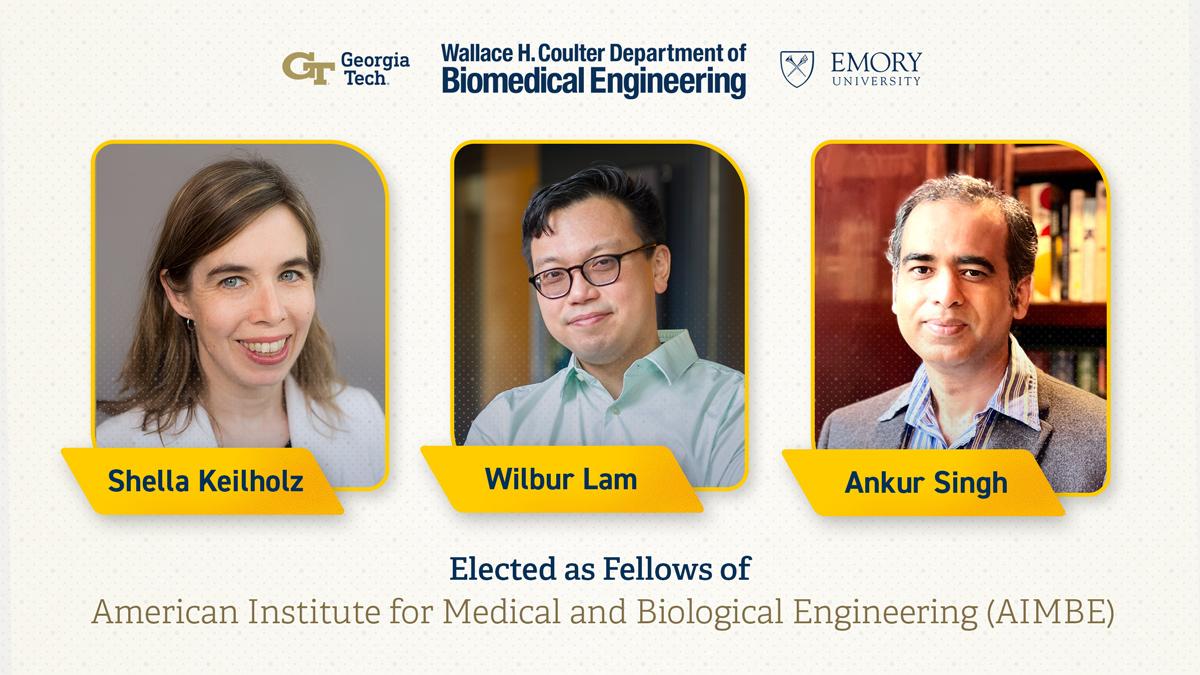Three faculty members in the Wallace H. Coulter Department of Biomedical Engineering have joined the distinguished College of Fellows of the American Institute for Medical and Biological Engineering.
Election to fellow means Shella Keilholz, Wilbur Lam, and Ankur Singh are considered among the most accomplished professionals in the field: Fellows represent just the top 2% of medical and biological engineers in the nation, according to the organization more commonly known as AIMBE.
“Being elected as a fellow of AIMBE is one of the most significant honors of my career,” said Lam, a physician and professor in the Coulter Department and the Emory Department of Pediatrics. “Almost every fellow in AIMBE right now, including faculty from our own Department here at Emory and Georgia Tech, is a biomedical engineering hero of mine.”
Keilholz echoed that sentiment and said she is looking forward to engaging with other fellows.
“What impresses me most about AIMBE is the expectation that fellows give back to society and advocate for science. I’m honored to be part of a group that is dedicated to making the world better,” Keilholz said.
Singh called his election as an AIMBE fellow “pivotal to my academic career. It will now allow me to work with a cohort of dedicated scientists toward developing and implementing innovative approaches to bioengineering education, research, and advocacy for research funding.”
Singh is an associate professor in Coulter BME and Georgia Tech’s George W. Woodruff School of Mechanical Engineering. His research lab creates biomaterials-based immune tissues to mimic the structure and function of lymph nodes so they can study interactions between cells and cell decision-making. These models are tiny 3D tissue cultures grown from patient cells called organoids, or “on-chip” systems that draw inspiration from circuits on a microchip to create tiny channels and chambers on silicon wafers that recreate the flow and forces of tissues in the body.
Keilholz, a professor in the Coulter Department, also has been serving as interim associate chair for faculty development. Her work connects neuroscience, signal processing, and complex systems analysis to develop imaging methods to study networks of activity in the brain and provide tools to diagnose and treat clinical manifestations of brain dysfunction. The AIMBE College of Fellows also highlighted her work increasing inclusivity in science.
Lam’s lab integrates micro- and nanotechnology and experimental hematology and oncology to study, diagnose, and treat blood disorders, cancer, and childhood diseases. He also leads the Atlanta Center for Microsystems Engineered Point-of-Care Technology Center, which has played a key role in validating the accuracy of Covid-19 at-home tests for the National Institutes of Health.
Lam called himself a late-blooming biomedical engineer, which makes fellowship in AIMBE all the more special, he said. Lam didn’t major in engineering in college and was a physician-in-training before he became “enamored by the field,” and only went back to pursue a Ph.D. in bioengineering after his pediatrics residency.
“As such, to receive this bona fide biomedical engineering accolade by the top biomedical engineering society is especially humbling and gratifying for me,” Lam said.
Becoming a fellow of AIMBE is increasingly difficult, and it comes with expectations, as Keilholz noted: The organization expects fellows to give back, advance excellence, and advocate for medical and biological engineering.
Singh said the competitiveness of the selection process for new fellows is not lost on him, and he is grateful for the opportunity to contribute.
“Election to AIMBE underscores the importance of thinking outside the box and championing transformative interdisciplinary research,” he said. “I am fortunate that the outstanding environment at Georgia Tech and my collaborations with Emory Medicine, among others, continue to provide a fertile ground for pushing cutting-edge research.”
Singh, Lam, and Keilholz join more than two dozen current Coulter Department faculty members as AIMBE Fellows, including former chair Susan Margulies, who has served as chair of the AIMBE College of Fellows for 2021. Several of the association’s fellows are Nobel Laureates, and many are members of the National Academies of Science, Engineering, and Medicine.The 2022 class of fellows also includes another Georgia Tech researcher: Omer Inan, associate professor in the School of Electrical and Computer Engineering and a member of Coulter BME's Ph.D. program faculty.
The new class of fellows will be inducted officially at the organization’s annual meeting in March.
Latest BME News
Jo honored for his impact on science and mentorship
The department rises to the top in biomedical engineering programs for undergraduate education.
Commercialization program in Coulter BME announces project teams who will receive support to get their research to market.
Courses in the Wallace H. Coulter Department of Biomedical Engineering are being reformatted to incorporate AI and machine learning so students are prepared for a data-driven biotech sector.
Influenced by her mother's journey in engineering, Sriya Surapaneni hopes to inspire other young women in the field.
Coulter BME Professor Earns Tenure, Eyes Future of Innovation in Health and Medicine
The grant will fund the development of cutting-edge technology that could detect colorectal cancer through a simple breath test
The surgical support device landed Coulter BME its 4th consecutive win for the College of Engineering competition.








